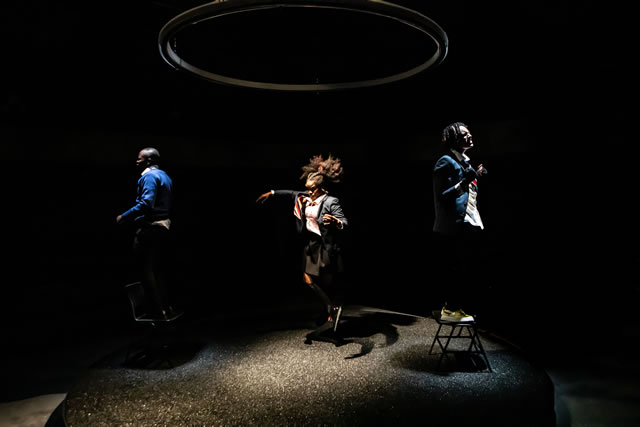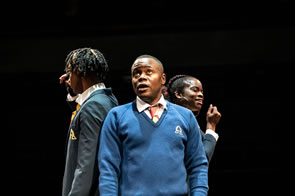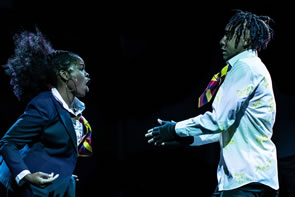'Beautiful Piece Of Black Theatre Crammed With Feelings But Hard To Fully Understand'
Liz Vercoe reviews Little Baby Jesus – at the Orange Tree Theatre, Richmond

Anyebe Godwin, Rachel Nwokoro and Khai Shaw
Don't be fooled by the title into thinking this is an early nativity play, where kind and humble parents lovingly support a tiny saviour of the world. That's a story that the characters of this narrative would barely recognise from personal experience. Instead they seem to go directly from overburdened childhood to emotional crucifixion. In London, in a struggling state school, nowadays.
And unless you know that world from recent personal experience you could well struggle to follow the "real talk" of these three young black kids remembering their schooldays and a time when they still had dreams untarnished by the reality around them. Real talk, the programme notes explain, is the personal language of black youth through which it instinctively preserves its mix of cultural identities. Rap without the rhymes and rhythms.

Khai Shaw, Anyebe Godwin and Rachel Nwokoro
Central to the play is Rugrat, played by Khai Shaw, a kindly class disruptor with an instinct to stay out of serious trouble; the love of his life is Joanne, played by Rachel Nwokoro who is perfect as the lippy, cheeky, hip-swinging teenager with a basilisk stare of disapproval; and then there is serious, gentle, somewhat-lost Kehinde, played by Anyebe Godwin, who is steeped in Nigerian folklore and in awe of his twin sister, his older brother and, definitely, his grandmother.
It is a sign of the skill of the writer, the multiply-talented Arinzé Kene, and the director Tristan Fynn-Aiduenu (winner of this year's JMK award for young directors) that despite missing some jokes and references (clearly caught by others in the audience) we easily follow the teenagers' stories during the first half of the play. All interwoven with typically childish unworldliness involving amateurish fighting, footballs, unwritten codes of conduct and sweets. What's more, Kene has the gift of writing straight from the heart of black experience so that others can share it, most recently portrayed in his stunningly good play Misty. Little Baby Jesus was one of his first pieces, written in 2011.

Rachel Nwokoro and Khai Shaw
But children have to grow up, some more violently than others, and the second half loses its clarity as the play becomes more mystical in response to this. Also, the cast's ability to represent the development of other characters as well as their own, starts to become strained. While Joanne's character does continue to grow seamlessly many of the invisible characters of the first half fall on Shaw's shoulders. It takes a far greater physical and vocal transformation than ever-widening eyes for Rugrat to deliver both Joanne's former lover Baker and the malevolent, knife-carrying Jerome, yet they are at the heart of the most chilling section of the play, the one that gives it its title (although Moses might have been more appropriate). Equally unclear is the meaning of Kehinde's ghost-like (or possibly not) meeting with Joanne, even if its outcome for Joanne is not. Rather than answer this, the production uses the trio's combined tragedy and the unfairness of life as a sudden springboard for a final chorus of the secrets of survival. The intent of this is noble. The question is, can anyone who has lived lives like these three messed up children, possibly hear it?
Liz Vercoe
Images: Ali Wright
October 25, 2019
Related links
|